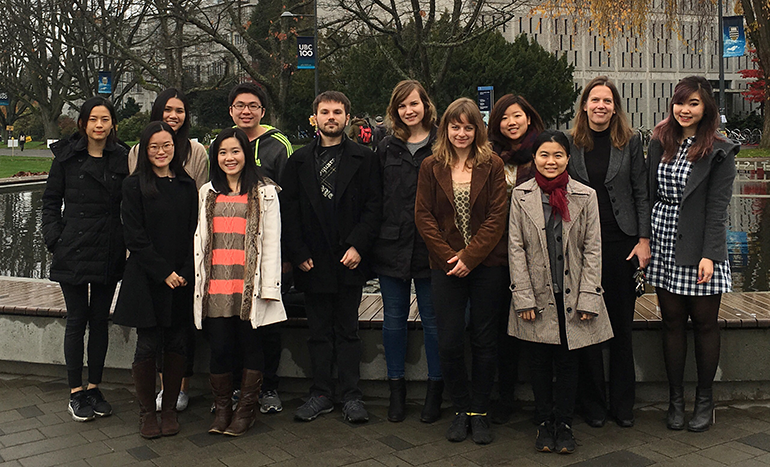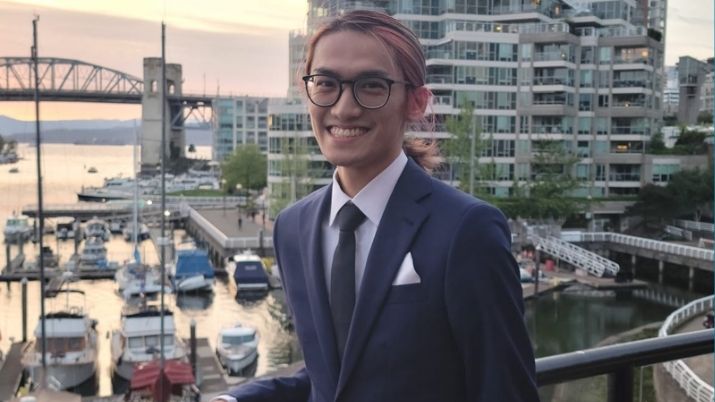

The Health and Development Lab Team
In order to promote healthy aging, is essential that critical factors such as motivators, facilitators, and obstacles to social engagement, healthy lifestyles, and well-being are understood. Striving to achieve this goal, the Health and Development Lab at UBC aims to: A) Tackle the social and motivational resources that allow older adults to optimize their own health and well-being. B) Better understand how spouses may promote each other’s health by collaborating on everyday tasks. C) Engage in regular dialogue with allied health disciplines and community partners to generate outcomes that matter. This is the mission that Dr. Christiane Hoppmann and her team have embarked on. Dr. Hoppmann, the lab director of the Health and Development Lab, is an associate professor in health psychology and Canada Research Chair in Health and Adult Development in UBC’s Department of Psychology.
Learn more about the lab, their unique approach to recruitment, and the team’s research projects.
A booming focus
“We want to understand how we can facilitate successful development across the adult lifespan and into old age,” says Dr. Hoppmann. As the baby boomer generation approaches retirement age, promoting healthful behaviours among older individuals and fostering an environment in which to do so has become increasingly important. It is also essential to look at health as a whole rather than in segments. “When we look at health, this includes emotional well-being, physical health, and cognitive performance,” says Hoppmann. However, as we age, the ability to maintain these functions becomes more difficult. In order to deal with these difficulties, Dr. Hoppmann and her team propose that we draw support from another source. “If you are looking at old age, or a situation where cognitive resources are declining, and health resources become more limited, it can help to bring in someone else to accomplish what cannot be done alone. This collaborative aspect of social relationships has a huge potential. That’s why we are trying to identify which aspects of a particular relationship are conducive to health.”
The research done by Dr. Hoppmann and her lab members mainly focuses on older community-dwelling participants (ages 50 and up). “With older adults as key partners, we aim to capture the everyday experiences that draw adults towards health promoting activities using iPad minis while at the same time empowering them to learn new technological skills. What it allows us to study is life as it unfolds,” explains Hoppmann. “We can take this information from their daily lives and link it to the longer-term outcomes we are interested in.”
An open-minded approach
Repeated daily life assessments using iPad minis, often referred to as time-sampling, is only one of the few designs which are used in this research. Various studies also include long-term longitudinal and experimental approaches which are conducted by Dr. Hoppmann’s graduate students. “Using different methodologies often serves to provide more rounded solutions to the questions that we ask,” says lab PhD student Pavel Kozik.
Recruiting people from varying socioeconomic and cultural backgrounds serves to provide an essence of the social context. “We recruit people from all walks of life,” says Hoppmann. One of her lab members, Jennifer Lay adds, “Oh yes, we’re interested in communities around Kitsilano, but we’ll also go to Chinatown…you can really see the diversity in the lab.”
One of the most noteworthy aspects of Hoppmann’s research is her eclectic approach in developing her research with many different avenues of psychology and health. “Virtually all of my research is done collaboratively including colleagues in physiotherapy, medicine, and other allied health fields,” says Hoppmann. Hoppmann is also a core member of the UBC Centre for Hip Health and Mobility, which brings together scientists, clinicians, and knowledge translation agents to solve complex problems and implement solutions that promote active aging. “Another thing that is near and dear to my heart is that we take our research out of the lab and directly into the community. We believe it takes expertise and multiple, different methodologies to solve the complex questions of what promotes healthy aging.”
Meet the team
This approach of drawing from varying resources is clearly embodied within the structure of the research team itself. Made up of 5 graduate students, each member adds his or her own expertise to the mix.
Pavel Kozik: Working on his first year in the Ph.D. program, Pavel has an interest in cognitive aging. His research looks at potential ways to mitigate cognitive decline. His studies look at visual attention and whether cognitive performance measured by visual search can be improved with the help of the spouse.
Jennifer Lay: A second year Ph.D. student, Jennifer’s research focuses on the correlates and consequences of solitude. She seeks to understand both the benefits and challenges with spending a lot of time alone. Jennifer is also conducting research in Hong Kong with the intention of disentangling cultural and immigration effects on healthy aging in East Asian and Caucasian older adults.
Lu Minjie: Lu is visiting from Hong Kong and working on age-related differences in the role of discrete emotions for fostering goal pursuit in adolescents and their parents. Lu is a third year Ph.D. student.
Victoria Michalowski: Victoria is a first year Ph.D student who spearheads a time-sampling study with older adult couples. She is examining the impact of spousal collaborations on stress, physical activity, and health.
Amy Ho: A second year master’s student, Amy’s research is focused on the associations between pain, perceptions of pain, and physical activity. She is running a study on sedentary, older men and investigating the barriers to physical activity in that group.
This tight knit group of researchers and scholars are drawn together by their shared vision of promoting health with aging and are interested in further extending the boundaries of older adults and their ability to optimize their own aging outcomes.
-Samantha Yang
Related:
Profs Christiane Hoppmann and Catharine Winstanley awarded UBC Killam Research Prizes


